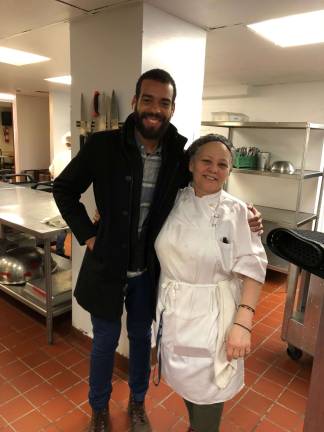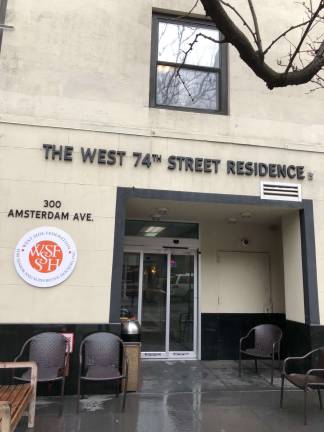perseverance and persistence on passover


West Side seniors celebrate redemption from slavery — and a victory over building developers — at their annual Seder
By Shoshy Ciment
For about 100 senior citizens on the Upper West Side, the Jewish holiday of Passover represents more than matzah and a traditional meal, or Seder. Having faced a potential exile of their own between 1983 and 1985, the senior inhabitants of the West 74th Street Residence celebrate victory and redemption from slavery — and building developers — every year on Passover night.
In 1983, the residence, formerly known as the Lincoln Square Home for Adults, was going to close after the owner of the private for-profit adult home sold the building to a developer who planned to convert it into luxury condominiums. The 150 senior residents were given 30 days to find an alternate living situation.
But many residents would not go down without a fight. Led by resident and activist Rose Gale, 40 residents organized a coalition of various local non-profit agencies and local officials to halt the sale of their home.
Although they lost in court, the residents won a moral victory. Sympathetic to the plight of the residents, the developer agreed to a compromise. The West Side Federation For Senior and Supportive Housing, Inc. (WSFSSH), which works to provide affordable and accommodating housing for seniors, bought six floors of the building. With a new entrance on Amsterdam Avenue, the agency continued running the home as a licensed facility under the Department of Health.
“At the time we took over the home, the majority of the residents were observant [Jews], including several Holocaust survivors,” explained Laura Jervis, the former executive director of WSFSSH for 38 years. Despite the compromise, Jervis and the board of WSFSSH worked to accommodate the religious traditions of the residents.
After it assumed jurisdiction, WSFSSH established a kosher kitchen, programming for the High Holidays, and a Passover Seder, which has since become a community-wide event that brings in over 100 people yearly.
Although the home has distinctly Jewish roots, many attendees of the annual Seder represent different of faiths and backgrounds. “It’s a mix of Jewish and non-Jewish people who come to the Seder,” said Eustacia Smith, the West 74th Street Residence administrator. The Seder is open to all residents of a WSFSSH residence and their families.
“It’s a huge undertaking,” said Rabbi Ellen Flax, the rabbi of the residence who has been leading the Seder for 25 years and has been overseeing the kitchen for 20. “It’s a full house.”
To prepare, the kitchen staff of the residence closely follows Jewish dietary law to ensure a kosher holiday. The kitchen boils water to cleanse the countertops, covers most surfaces in tin foil, and uses an entirely separate set of dishes and cutlery.
“[It’s] a lot of work, but we do it, happy and laughing,” said Mayra Larancuent, a cook at the residence for the last six years. “We like it.”
The effort of the kitchen staff is certainly tangible. Every year, residents — religious or otherwise — gather to celebrate a story of exile and redemption with all the classic features of a traditional Jewish Seder.
“It’s a beautiful celebration,” said Erick Splick, the food service manager who has worked at the residence since 2010. “What I like about the ceremony is that everybody is welcome.”
While not all attendees at the Seder will fully relate to the Jewish story of deliverance from slavery, their shared love for the West 74th Street Residence transcends religious boundaries.
“I’m glad we still do it,” said Renee Taub, a senior at West 74th Street Residence who will be attending her 10th Seder at the residence this year. “It’s an honor to go to it.”